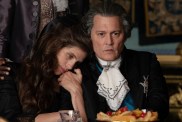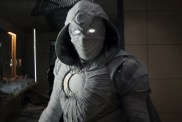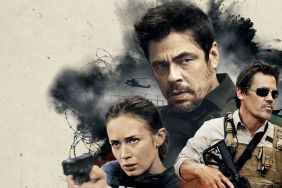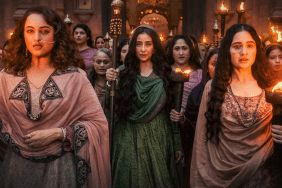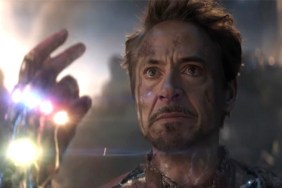Filmmaker Denis Villeneuve (Maëlstrom) may be best known within the fairly secluded arts community that is Montreal, but his fourth film Incendies offers the type of powerful dramatic emotions that’s already made it an audience favorite at dozens of film festivals, got it eight Genie Awards (Canada’s equivalent of the Oscars) as well as an Oscar nomination in the Foreign Language category.
The story follows a pair of twins living in Montreal, Jeanne and Simon (Mélissa Désormeaux-Poulin, Maxim Gaudette), whose dead mother Nawal Marzan (Lubna Azabal) leaves a will that sends the two of them on a mission to find their true father as well as to locate the brother they never knew they had. The film follows each of the twins as they make one leg of the journey through the Middle East while at the same time, flashing back thirty years to show Nawal’s dark past before coming to Canada. Based loosely on the play of the same name by Wajdi Mouawad, it’s a family drama on one level, but it also deals with the bigger issue of the civil unrest in the Middle East, particularly in Lebanon, in such a gritty and realistic way without creating any illusion of it going for any sort of actual historic accuracy. And that’s pretty much all that we can say about the movie, because part of its power lays in the number of shocking events and twists.
Being that Incendies is currently the Weekend Warrior’s favorite movie of 2011–and so far, the only one he’s given a perfect 10 out of 10 review in years–we sat down to speak with the French-Canadian filmmaker for over 30 minutes about all aspects of the film including one of its early fans, the band Radiohead. Incredibly humble and self-effacing, Villeneuve was equally surprised and impressed that we had watched the two-hour movie twice before speaking with him.
ComingSoon.net: This isn’t a conventional movie based on a play because it does not feel like a movie based on a play.
Denis Villeneuve: I know.
CS: Did you attend the play without any intentions of adapting it and were inspired by seeing it? How did you find out about it?
Villeneuve: The answer is not very extraordinary, it’s very basic. The thing is that I went to see the play just by curiosity. I was not looking for material, it’s just that I just fell in love with this powerful story and the meaning of it. It’s a four-hour play and in this play, every time a character opens his mouth, he talks for four pages. It’s a very, very talkative play, very dense, but out on the sidewalk, after I’d seen the play, I said to myself, “I cannot believe but I will make a film out of it.” For me, film projects, it’s always the same, it feels like destiny. “Oh, no, I will have to do that even if it’s going to be a lot of work.” I did my best to convince the author.
CS: He was there the night you saw the play?
Villeneuve: No, no, no, it’s just that Montreal is very small. The Montreal artistic community is a very small family, and I was seeing him from time to time on the sidewalks and we were polite. He’s someone who is very well known in Quebec, it was very easy to find this guy. I saw him maybe two days later outside this theater drinking a coffee, and it took a while to convince him, but I did succeed, and he said, “I will give you the rights under two conditions. The first condition is that you have to make it your own. I give you total freedom. Even if you make a piece of sh*t, I will love you anyway. This is true.”
CS: Had he seen your other movies at least?
Villeneuve: Yeah, yeah, he knew my work. “My work”… I’ve made two feature films, but let’s say that the truth is that in Canada my name is well known. He knew who I was, and he’d seen my previous film.
CS: What was the second condition?
Villeneuve: So total freedom and the second condition was, “I suffered a lot writing this, you will suffer a lot, but you will suffer alone because I’m going back to Paris.” He was writing his new project and he said to me, “You know, plays are like women. I cannot love two women at the same time. Now I’m attracted by this new woman called ‘Forrest'” – this new big five-hour play about the second World War, and he said, “It’s a huge, huge piece and I have no time to make a screenplay so you’re going to be alone. If you agree to be alone then I won’t help you at all, but you can call me anytime, I can give you advice, but I won’t be there.” You mentioned previously that the film doesn’t look like a play, and it’s because this idea that I had so much freedom and to make the play my own, I did have to go far away in the cinema world, leave theater. I love cinema that’s close to theater sometimes, I love theater, but it’s just for this play, in order to really make it my own, I did have to go very far into cinema. It was a long writing process, and everything for me that was theater, I just removed it – characters, 96% of the dialogue I removed, I removed all the words. The thing is that in the play, there was no such thing as traveling. The characters always arrive at their destination right away and they were talking about what they saw, but cinema is fantastic, because you can move across landscapes and see the effect of a journey on a character and that made a huge difference for screenwriting.

CS: I assume a lot of the events and locations we see in the movie are described by the characters in the play, so how did you go about finding these locations. It’s a little vague where it takes place and you assume because of Wajdi’s background, it’s Lebanon, but it’s never called that.
Villeneuve: It was this in the play, and when you were out of the play, you were assuming, “Was it Lebanon?” and then you do a little research and you realize that all the names he’s talking about are fiction, it doesn’t exist.
CS: Believe me, I Googled all those places and couldn’t find any of them.
Villeneuve: It’s the same in the play. I kept the same names as the play. There’s nothing true there, but still, the bus attack – Wajdi when he wrote this play, he based it on several key moments in the Lebanese Civil War of the ’70s and ’80s, like for instance, the camp massacre of the Sabra Shatila, the bus attack, that happened in 1982, he based the mother character on a woman named Soha Bechara. Soha Bechara is a young woman that in the ’80s… Wajdi when he was young was living in Beirut, in Lebanon, and his neighbor was a little girl named Soha Bechara, and when the war started, Wajdi’s family moved to Canada and she stayed there. She was his friend and when she was 18, after the Sabra Shatila massacre, she tried to kill the military chief of the Right Wing Christian section South of Lebanon. They were against Palestinians over there, and she was Christian, but more Communist. He was really impressed by her political engagement and resistance because when she did this murder attempt, she then spent ten years of her life in a jail smaller than the table here. He was very impressed by the way she resisted torture and kept her mental sanity, so the character is based on this resistance, but besides that, everything is fiction. It’s not a portrait of Soha Bechara at all, all the elements of the story, there is a big poetic transposition and I decided to keep the same to do the film, because if you put back all those elements in the right place in the history of Lebanon, then you have a big problem, because there is so much fiction in the story, it became a bit morally weird to talk about history in such a twisted way. There are too many fictional elements like the rape…
CS: But the parallels are really obvious.
Villeneuve: Yeah, it is. When the Lebanese are seeing the film that amazes me. I was just in Beirut last week, and they saw it as a historical movie. They say, “It’s so close to our historical war, it’s exactly how it happened.” I say, “No, it has no historical value at all. Please don’t say that, because on purpose, the accent is not right, the landscapes are not right.” For me, the way I did it was to say, “Okay, we’re talking about this war, but I’m not a foreigner, I don’t know what I’m talking about, it’s a lie, so let’s assume that it’s a lie, and I’m neutral.” That’s important. The play was politically neutral and I want the film to be politically neutral also, because it’s a movie about peace, about ending the cycle of violence, so I don’t want to be part of this conflict. It was very important to set it in a fictional land like this.
CS: For someone who didn’t want to set the movie (or play) in Lebanon, you probably created one of the more realistic films set in the Middle East by not being specific about it.
Villeneuve: The thing is that it was amazing to shoot in Jordan because I found that from an imaginary point of view, I found the exact landscape I was looking for that I had in mind when I was looking at the play. It was a fantasy place to shoot because north of Jordan looks very close to the south of Lebanon. In fact, Lebanese thought I shot in Lebanon, and when they ask, “Where did you shoot in Lebanon? Was it there, or there, or there?” I said, “No, I was in Jordan.” I shot in Jordan because a Lebanese director said to me, “Do you want to do that? Go to the North of Jordan” because I was looking for a landscape that has not been touched by war in the beginning and South of Lebanon is a battlefield and the people, when I was shooting in the south of Lebanon, they were still rebuilding their houses after the 2006 war. It’s a never-ending war in this part of the world, so it’s always rebuilding, so it’s not a good place to shoot. Morally, it’s very weird to go there and say “Stop rebuilding your house, we have to shoot this scene.” No, I didn’t want to do that.
CS: As you were writing this, you must have pictured a lot of those locations but did you do any kind of location scouting beforehand to make sure these places in your mind actually existed?
Villeneuve: I’d been in Jordan before a long time ago but not in this area, and when I arrived there… for instance, Narwal’s village, the small village at the beginning, was exactly the kind of tree, the kind of light, the kind of landscape I was looking for. It’s very weird to write something and then scouting over there for weeks and weeks and months and when I arrived there, I said, “This is the place.” It was a remote place so very far away. It was a pain in the ass logistically, but for me, it was the place to shoot those scenes. It was nearby the Israeli border on the north of Jordan and a perfect place to shoot.
CS: I don’t know how André (the film’s DP) got some of those shots. He must have been climbing up mountains and doing all sorts of crazy things to get some of those shots…
Villeneuve: Do you know André the DP?

CS: No, I don’t know him but I really respect his work because just watching some of those scenes, I’ve never been to Jordan, but I can just tell it must have been hard capturing those landscapes.
Villeneuve: André is a stuntman, he likes when it’s dangerous and complicated, and the thing is that during research before the movie, I showed him a lot of photographs, a lot of film extracts of what I wanted and I said I wanted something as natural as possible. Our work together before was very elaborate, very aesthetically stylish, we were trying to make beautiful images all the time, but on this one, I wanted us to be laid back aesthetically, just the story first. I didn’t want people to say “Wow, how beautiful the images are.”
CS: Well, you failed there, because the film still looks beautiful, though it does look more natural rather than stylized.
Villeneuve: Right, we wanted the style to be more subtle. I wanted us to grow up as a team, Andrew and me, and we arrived with this suggestion. In fact, André arrived and said to me, “We should shoot the movie without artificial light, just sunlight” and that was a brilliant idea.
CS: Were you able to do that for the whole movie? Not the interiors I’d assume.
Villeneuve: The jail, because we shot the jail in a basement, and the notary office in the beginning, there was light, because it was winter and it was not possible to shoot three days, so there’s artificial light maybe 4 or 5% of the film, the rest is all natural light. Me, I’d like to say “full natural light” but then André would say, “You’re lying.”
CS: It’s still pretty amazing. I want to talk about cast because Rémy Girard is a bit of a ringer since he’s one of Montreal’s top actors, but what about the actresses? Did they all have Arabic backgrounds?
Villeneuve: Rémy I thought about while I was writing and the others, Lubna Azabal, the mother, she’s Belgian, but her origins are from Morocco, and I’m so proud of her work because she was the perfect woman to play this part to have this strained world inside her.
CS: A lot of it’s make-up but the fact she can play these different ages is really amazing.
Villeneuve: Yeah, yeah. She has a face that was able to… she made a video test before I cast her that she looks almost 18 with no make-up, very young, so I said, “We know that this actress that was 32 can play a 22-year-old woman at the beginning, the audience will accept this idea maybe” and for the aging, she has a face that according to my make-up artist, it was not that difficult to age. That I’m very happy (about) because at the beginning I was maybe thinking to take two or maybe three actresses to play the same part, to play the young Nawal, but still, she was able to go through all those years, I was very happy about that.
CS: I was also impressed because Mélissa (Desormeaux-Poulin) actually does look like her daughter. In the moments you’re going back and forth between the past and present, you have to do a double take because they look so similar.
Villeneuve: This is my dream, because in the screenplay, there was the idea that I would play with shadows in between the scenes. Seeing a woman walking in the dark and then seeing another woman and we think it’s the same, but in fact, we’re going to the daughter or from daughter to the mother, and I didn’t use any cinema trick, because I realized very quickly that the look the same. They have the same way to walk and the same angle of the face.
CS: I wasn’t sure how you did that, whether you had one watch the other’s work or what.
Villeneuve: That was cinema magic. It’s just from casting, I cast Nawal first and then I cast the daughter according to the faces, and it really worked. I’m very happy about it, because it’s about transmission between two generations, and I wanted them to have this type of confusion between the two characters. In the stageplay, there was always dialogue between the mother and the daughter at the same time, and I thought it was really beautiful, and I was looking for a cinematic way to do the same thing.

CS: One thing that also takes the film away from the play is that you have these four amazing actors and they have very few scenes together. You might have one scene with mother and daughter, a couple of scenes with the twins together… were you shooting all of these different storylines at different times? You have a few of the same locations between the past with Nawal and her daughter and son, so how did that work logistically to shoot scenes with different actors in the same location 30 years apart?
Villeneuve: Ah, the shoot was made during three times. First, we were shooting at the end of winter, then we went to Jordan and we did the swimming pool scene, because it has to be done in the summer. The swimming pool with the mother was in Canada. In the screenplay, I was aware that there were so many elements of the story, every sequence of this film can make a feature film. You can make a film about someone who is in jail… for me, I was terrified by the fact that there were so many dramatic events and so many scenes, so it means that at one point, I did have to go with minimalism about the relationships between characters, to just give clues and then the audience will make the links between (them). For instance, we never see Simone with his mother. We just know that he’s very angry about his mother and he thinks she’s a crazy woman and he doesn’t like her at all, but actually, we never see them together. I wrote dozens of scenes of them together, but one thing I love about cinema, I don’t know if you’ve seen a film called “Birth” from Jonathan Glazer, written by Jean-Claude Carriere? I loved this film, it was amazing. What I love is that we’re thinking about a relationship between a woman and her husband for all the movie but we never see them together. It’s about the mourning about her husband, and I thought it was really brilliant how they were able to talk about the past while always staying in the present, no flashbacks, never. That I think was pure cinema, and I tried to do the same with “Incendies.” I rewrote the scenes a lot so that you can always guess about the relationship and to fill the holes with your imagination instead of showing it. It’s just very scary because this was the first time I was doing that and if you miss one point, the audience won’t understand the relationship between the characters.
CS: I obviously don’t want to give away any of the film’s twists, but one thing I’m curious about is how the film ended because we have a pretty big revelation towards the end but we don’t really see how it affects the characters. Did the play deal more with that?
Villeneuve: Yes, that’s true. It was like this in the play. I did try to respect as much as possible the structure of the play that I thought was absolutely fantastic. I think the reaction afterwards is another film. (laughs)
CS: But it also allows the viewer to have their own thoughts and use their own imagination about what happens next, which is another thing I love about it. I was curious about other decisions, like showing the brutal violence of the bus attack but not showing the rape. You very specifically cut away and had it take place off-screen. Any other director would have made it very brutal and intense, but it’s even more uncomfortable not seeing it happen. Was that planned from the beginning?
Villeneuve: For me, I hate violence, so what I was trying to do with the rape scene is to show violence with no movement, immobility, no gesture, just a guy standing and a woman sitting and you feel that violence will come. I don’t think you can put this scene before the bus attack, you can put the rape after the bus attack, because you’ve seen the bus attack before, so you’ve been traumatized from violence and then emotionally, there’s a kind of trauma that allows you to fill the holes. I think it’s intuition, and believe me, I thought it was necessary to show the bus attack in order that we understand this story and why decides to go towards violence herself. In order to understand the main character’s tragic story, I did need this violence there. The play was more violent by the way. There was by far more violence. There was the bus attack and then she was going through the massacre of the camps, there was descriptions of a lot of horror, but in cinema, it’s a bit cliché, but one image equals a thousand words, so I just need to show one action and it was enough.
CS: Well, for whatever reason you did it, it certainly works and has the desired effect, and this is from someone who has seen it twice. I want to ask about the music because like everything else, it’s subtle and sparse and feels so natural, but then you have these Radiohead songs, which are so powerful but when they come in, it’s really quite a departure.
Villeneuve: I think that Grégoire Hetzel who made the music, he inspired himself from Mahler and Mussorgsky, two composers that I used while editing, and he had no ego at all–I love working with this guy, a French composer–and this music, I wanted it to be subtle and very discreet. But Radiohead is total opposite (laughs), it’s very smash-in-your-face. Radiohead was there since the beginning, Day 1 of writing, I was looking for a specific song that has the specific dramatic curve, and I was looking for something that was haunting or hypnotizing and at the same time, there’s a sadness to the song and the lyrics are perfect. It was for me the perfect song and the truth is that my favorite opening scene in a movie is “Apocalypse Now” with the Doors and the palm trees, and I thought when I was writing this scene now, “Apocalypse Now” is a scene about an identity quest in the middle of the war, and for me, “Incendies” is a little bit–I’m saying that laughing at myself–but to see just one palm tree like this with Radiohead was kind of an homage to Coppola’s movie that nobody will know. For me, I was looking for the 2010 song that would be able do the same job as The Doors.

CS: I thought it was great and seeing the movie for a second time – the first time you watch the movie, you don’t really know what’s going on although it’s an interesting juxtaposition of song and image.
Villeneuve: It’s counterpoint and the counterpoint is very important, because the goal of this counterpoint is to show the audience that what they will see is a Westerner’s point of view on the Middle East. It’s not true. When I was editing and I put Arabic music, it looks really authentic and you get the impression of being there for real, and I didn’t want to create this impression because I said to myself, “I must be honest with the audience. (chuckles) I must say to them right away that it’s going to be something artificial.”
CS: How did you get in touch with them to get to use those songs?
Villeneuve: That was the thing. This song was there since Day 1. I wrote the scene thinking, “Okay, it’s going to be this song.” I’m a big fan of Radiohead, I know all their songs by heart, but I didn’t put the song because of that. I don’t want to put songs that I love in my films, it’s just that I said to myself, “Okay, if I want to use Radiohead, this is the time. This is the perfect song,” but I said to myself, “It’s a dream because I’ll never get the rights and I thought it would cost a lot of money.” It was not about money, it’s worse than that. It’s that the band has to see the film and they have to look at it, and if they don’t like the film, that’s it, so Radiohead were the first to see the film, before everybody. I sent them the film, there was no sound mix, it was just rough sound, and no FX, and I was terrified to send them to it, but it was the only way. I sent them the film and two weeks later, I received a phone call that they loved the film. That was it.
CS: And you just had the music in the same three places?
Villeneuve: Yeah, yeah, exactly. There was two songs and this was the first film that they gave two songs, and to tell you the truth, I don’t know who did see the film in the band. In fact, someone just said to me “Tom and the guys loved the film” but I never talked to them, I never met them, but for me, it was a big huge gift, because for me, they are very inspiring artists. They are very innovative and always trying to break through the roof with their art, and I have a huge respect for Radiohead.
CS: You mentioned the reaction to the movie in Beirut, but you’ve taken this movie to a lot of different festivals all over the world. Sundance is very different from Toronto, and I was curious if you’ve seen very different reactions to the film depending on where you were.
Villeneuve: For me, honestly, the reactions, except from Lebanese, is always the same from Taiwan to Italy to Sundance to everywhere, because I think Wajdi Mouawad’s ideas are very universal, ideas that are talking to everybody, that amazed me. From Asia to America, it’s the same reaction. When there’s someone from Lebanon in the audience, it’s always (different) because those people react differently. Either they love the film and are deeply moved and they cry because it reminds them of part of their history that they don’t like to think about, and they are deeply touched by the way it is done from the victim’s point of view. There were some beautiful critics, especially in France, from a Lebanese critic. I know that some Lebanese loved the film and I did show it to Beirut last week and the reaction was very strong and moving, but I knew when I was Abu Dabi Film Festival, I remember clearly a Lebanese journalist that didn’t like the film at all, and he was trying to push the Q ‘n’ A, attacking (the movie), and after that, he came to me and said, “I am the one…” and we spoke together for two hours together about the movie, but he didn’t like the fact that I changed the names. “Why did you do that? You are so close to Lebanon and at the same time, you are so far away. Why are you telling the story instead of telling the real story?” I think Lebanese are going to be split.
Incendies opens in New York and L.A. on April 22.


